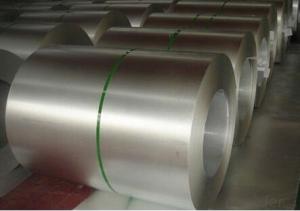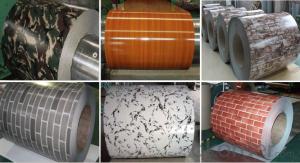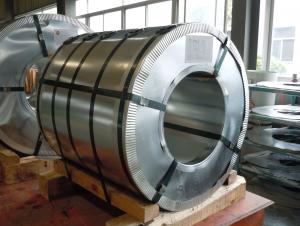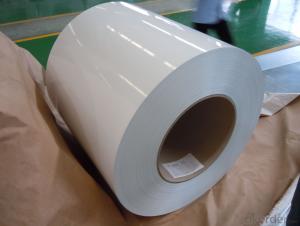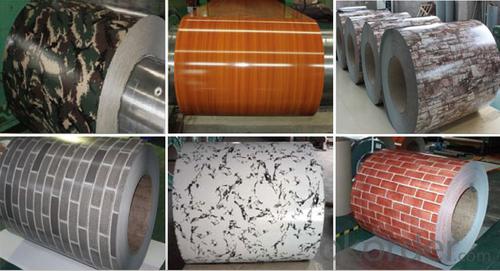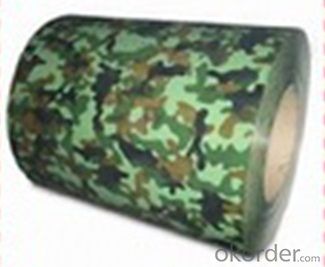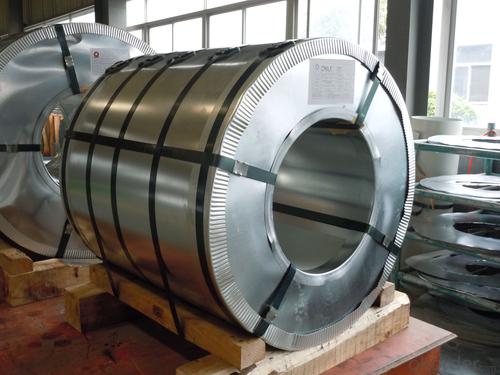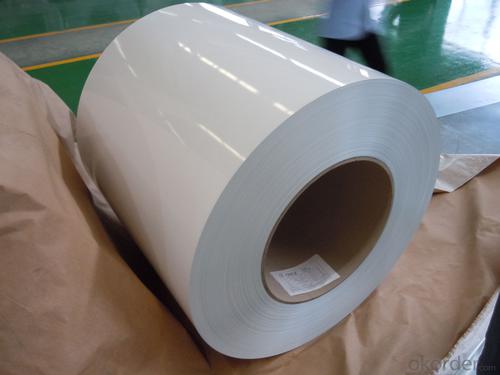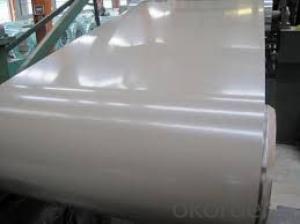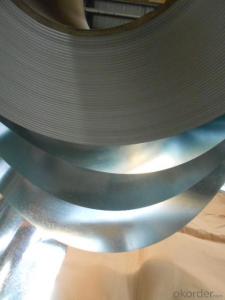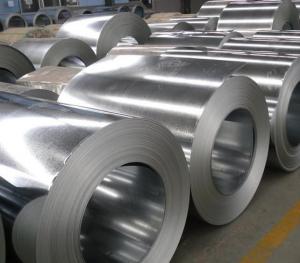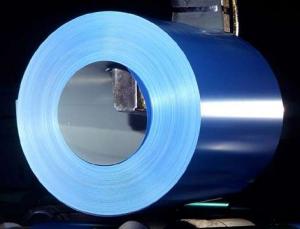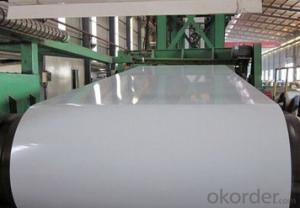Hot Dipped Galvanized Steel Coils GI / GL / PPGI / PPGL
- Loading Port:
- Shanghai
- Payment Terms:
- TT OR LC
- Min Order Qty:
- 50 m.t.
- Supply Capability:
- 100000 m.t./month
OKorder Service Pledge
OKorder Financial Service
You Might Also Like
Packaging & Delivery
| Packaging Detail: | mill's standard packing,sea worthy packing,steel pallets |
| Delivery Detail: | within 15-30 days after received the deposit or the LC at sight |
Specifications
hot dipped galvanized steel coils
1.FOB:650-1000SUSD/TON
2.size:0.13-0.6mm*750-1250mm*C
3.zinc coating:50-220gsm
4.chromate
hot dipped galvanized steel coils
NAME
| PPGI |
GALVANIZED
|
GALVALUME/ALUZINC
|
CERTIFICATE | ISO9001:2008 | ||
GRADE
| CGCC CGCH CGCD1-CGCD3 CGC340-CGC570 GRADE
| SS GRADE33-80 SGCC SGCH SGCD1-SGCD3 SGC340-SGC570 SGCC DX51D | GRADE33-80 SGLCC SGLCD SGLCDD SGLC400-SGLC570 SZACC SZACH SZAC340R |
MODEL NO | 0.16MM-0.8MM*1250MM OR UNDER | (0.127-1.2*1250MM OR UNDER | 0.12MM-2MM*1250MM OR UNDER |
TYPE
|
Steel coil Steel sheets/plates Corrugated steel sheets/plates
| Steel coil Steel sheets/plates Corrugated steel sheets/plates |
Steel coil Steel sheets/plates Corrugated steel sheets/plates
|
TECHNIQUE |
Ccold rolled -galvalume /galvanized -PPGI/PPGL | Cold rolled - galvanized |
Cold rolled -galvalume /Aluzinc
|
SURFACE TREATMENT | Mini/regular/big/zero spangle, Chromate treatment /chromate-free treatment /untreated unoile/oiled, TENSION LEVELLERT SKIN PASS anti-fingerprint/un-anti-fingerprint, Coating,color
| Mini/regular/big/zero spangle, Chromate treatment /chromate-free treatment /untreated unoile/oiled, TENSION LEVELLERT SKIN PASS anti-fingerprint/un-anti-fingerprint, Coating
| |
APPLICATION | Structural use ,roofing, commercial use, household appliance, industry, family
| ||
SPECIAL APPLICATION | Wear resistant steel, high- strength - steel plate | ||
- Q: Whats the difference in composition? When LTCS is used generally?Whats the temperature range, that these materials can be used? Is there any relation between Killed carbon steel, LTCS, stainless steel, carbon steel(normal)? How to categorise/classify these?Thankyou very much in advance..
- When exposed to elevated temperatures, quenched and tempered steels are more susceptible than normalized steels to permanent reduction in strength. This is especially true when exposure temperature begins to approach tempering temperature used when the parts were produced. In addition to losing strength, tempered steels also may experience reduced impact toughness after being exposed to long-term elevated temperatures. General belief is that this is the reason for LCC's reduced maximum allowable temperature limit of 345°C / 650°F in B16.34.
- Q: What are the challenges in coil recoiling for high-strength steel?
- There are several challenges associated with coil recoiling for high-strength steel. Firstly, high-strength steel is known for its increased hardness and strength, which makes it more difficult to coil compared to regular steel. The higher tensile strength of high-strength steel puts more stress on the recoiling equipment, leading to potential damage or failure of the machinery. Secondly, high-strength steel tends to have lower ductility, meaning it is less able to withstand deformation without fracturing. Recoiling high-strength steel coils requires careful handling and control to prevent any excessive bending or stretching that could cause the material to break or crack. Another challenge is the shape memory effect of high-strength steel. This phenomenon causes the material to return to its original shape after being deformed. While this property can be advantageous in some applications, it complicates the recoiling process as the steel coil may resist being reshaped into a new coil form. Furthermore, high-strength steel often has a more complex microstructure compared to regular steel, with different phases and grain boundaries. This complexity can make the recoiling process more challenging as it may affect the material's mechanical properties and response to deformation. Lastly, the surface finish of high-strength steel coils is critical for many applications. Recoiling can introduce surface defects, such as scratches or marks, which may affect the functionality or appearance of the final product. Therefore, maintaining a high-quality surface finish during the recoiling process is a significant challenge. In summary, the challenges in coil recoiling for high-strength steel include the increased stress on recoiling equipment, lower ductility, shape memory effect, complex microstructure, and the need for a high-quality surface finish. Overcoming these challenges requires specialized equipment, precise control, and careful handling to ensure the integrity and quality of the recoiled high-strength steel coils.
- Q: How do steel coils perform in extreme weather conditions?
- Steel coils are highly durable and resistant to extreme weather conditions. They can withstand intense heat, freezing temperatures, heavy rain, and strong winds without losing their structural integrity or performance.
- Q: How are steel coils processed for different finishes?
- Steel coils are processed for different finishes through various techniques such as hot rolling, cold rolling, pickling, and coating. Hot rolling involves heating the steel coils and passing them through rollers to achieve desired thickness and shape. Cold rolling further enhances the surface finish by reducing thickness and increasing strength. Pickling involves removing impurities and scale from the surface of the steel coils using acid solutions. Finally, coating techniques like galvanization or painting are used to provide protective and decorative finishes to the steel coils.
- Q: How are steel coils used in the manufacturing of automotive springs?
- Steel coils are used in the manufacturing of automotive springs as they provide the necessary strength and flexibility required for suspension systems. These coils are shaped, heated, and tempered to achieve the desired spring rate and durability, ensuring a smooth and controlled ride for vehicles.
- Q: What are the key players in the steel coil manufacturing industry?
- The key players in the steel coil manufacturing industry are typically large multinational companies that have significant market share and influence. Some of the prominent players in the industry include: 1. ArcelorMittal: As the world's largest steel producer, ArcelorMittal is a major player in the steel coil manufacturing industry. They operate in more than 60 countries and have a diversified product portfolio. 2. Nippon Steel Corporation: Nippon Steel is a leading Japanese steelmaker and one of the largest steel coil manufacturers globally. They have a strong presence in automotive and construction sectors. 3. POSCO: Based in South Korea, POSCO is a major player in the steel industry, including steel coil manufacturing. They are known for their high-quality products and advanced technology. 4. Baosteel Group Corporation: Baosteel is the largest steelmaker in China and one of the largest globally. They have a wide range of steel products, including steel coils, and are known for their strong research and development capabilities. 5. Thyssenkrupp AG: Thyssenkrupp is a German multinational conglomerate with a significant presence in the steel coil manufacturing industry. They have a diverse product range and focus on innovation and sustainability. 6. United States Steel Corporation: As a leading American steel producer, United States Steel Corporation plays a crucial role in the steel coil manufacturing industry. They have a strong presence in the automotive, construction, and energy sectors. 7. JFE Holdings, Inc.: JFE Holdings is a Japanese steel conglomerate and one of the key players in the steel coil manufacturing industry. They have a wide range of steel products and are known for their quality and customer-oriented approach. These are just a few of the key players in the steel coil manufacturing industry, and there are many other companies that contribute to this sector. The industry is highly competitive, and these companies continuously strive to innovate, improve efficiency, and meet the ever-evolving demands of the market.
- Q: Can steel coils be coated with magnetically attractive materials?
- Yes, steel coils can be coated with magnetically attractive materials such as iron or nickel, allowing them to exhibit magnetic properties.
- Q: I plan to buy a bushcraft knife ..The blade made up by damascus steel.My question is ,is damascus steel is very strong ?
- Pattern welded /damascus is too expensive to use as an everyday knife, as it can cost more than silver. It's best kept as a collection piece. You'd be stupid to keep it in your pocket or use it everyday. that would be a waste of money. Knives you use everyday might be lost or stolen, or they may get rusted, worn, or dirty..... ruining their value. From that point of view the strength or edge-holding ability means very little. Specifically, the bushcraft knife is pattern welded steel. True damascus or Wootz steel is something you'll only find in museums and private collections. they stopped making it several hundred years ago. Despite what many people have claimed, Wootz damascus was inferior to modern tool steels in every respect. It was a brittle, dirty material. It's legendary status has more to do with myth and storytelling. The reason they stopped making was undoubtaby because more modern methods came along that produced a more consistent product, more quickly and easily. Old technologies tend to be abandoned for good reasons. With pattern welded steel, about a dozen strips of two different grades of steel have been stacked, welded together, the twisted and forged to create interesting patterns. This more of an artistic process and doesn't improve the properties of modern steels. Pattern welded steel is for the most part, inferior to a homogenous blade made of a single grade of steel. First of all, PW is a handmade product which means there will be faults and oxide inclusions incorporated into the steel. The welding process is not perfect. Secondly, in the hardening and tempering process you end up with a compromise between the properties of the two different grades of steel. You end up with a product that is not quite as good as either steel would have been individually. The blade may either be too brittle or too soft.
- Q: How much should someone sell a 6 ft stainless steel counter? How about one with a sink?
- Sheet stainless steel is about $2.00 to $2.75 per lb. in the US right now for a 2B stainless steel without any special finish. The cost of a sink or counter is going to vary widely. The labor to fabricate it is going to be a lot higher than the material cost so the price per pound is not going to tell you much. In California a custom 6' counter would be somewhere between $1,200 and $3,000. A standard size single compartment sink would be about half of that.
- Q: What is steel made of and what is its molecular weight? It's for a project in chemistry class so if you have a website link as well, that would be great!
- Steel is an alloy consisting mostly of iron with a little Carbon thrown in. Steel is not a molecule, therefore, it does not have a molecular weight. Steel contains atoms of iron and carbon in a crystal lattice, along with various other alloying elements such as manganese, chromium, vanadium, and tungsten.
Send your message to us
Hot Dipped Galvanized Steel Coils GI / GL / PPGI / PPGL
- Loading Port:
- Shanghai
- Payment Terms:
- TT OR LC
- Min Order Qty:
- 50 m.t.
- Supply Capability:
- 100000 m.t./month
OKorder Service Pledge
OKorder Financial Service
Similar products
Hot products
Hot Searches
Related keywords
